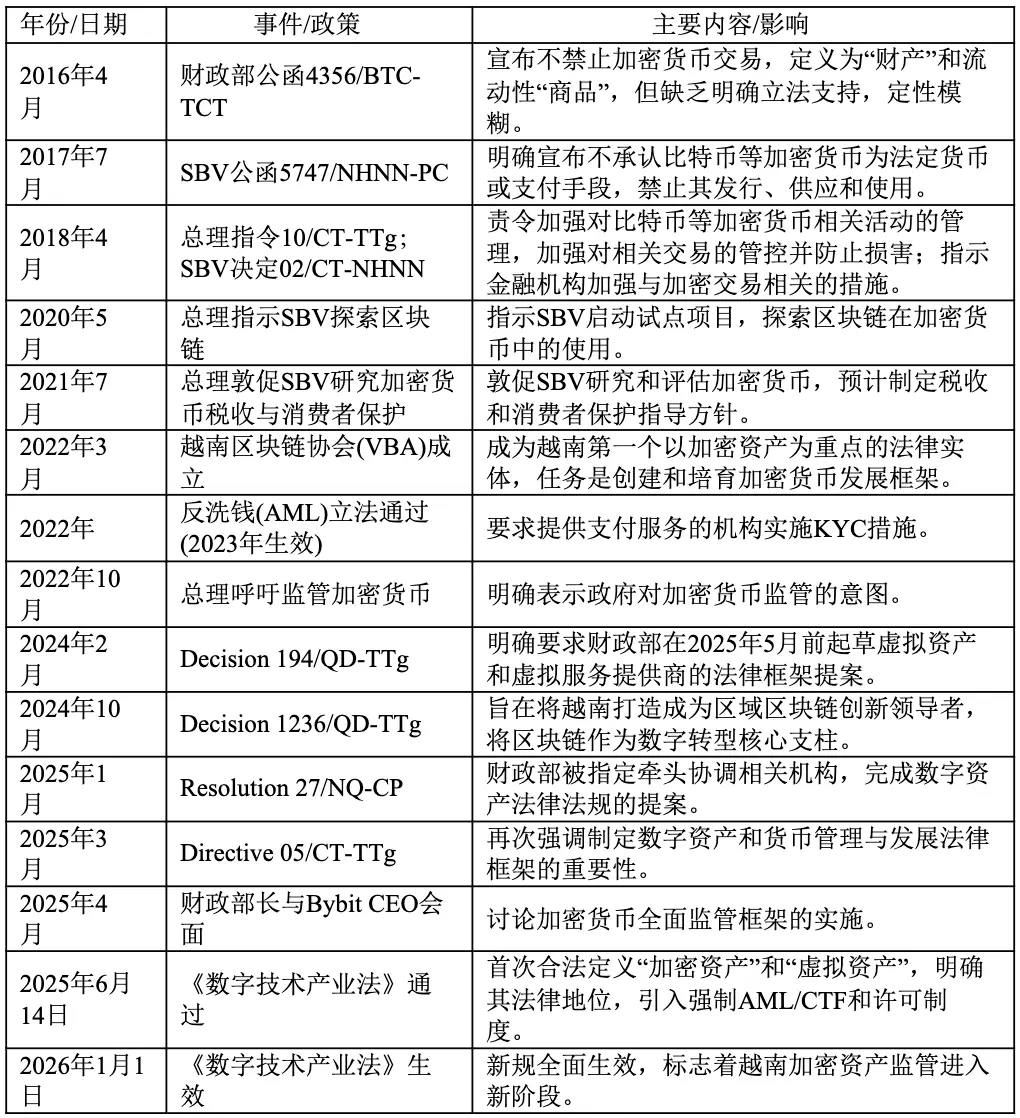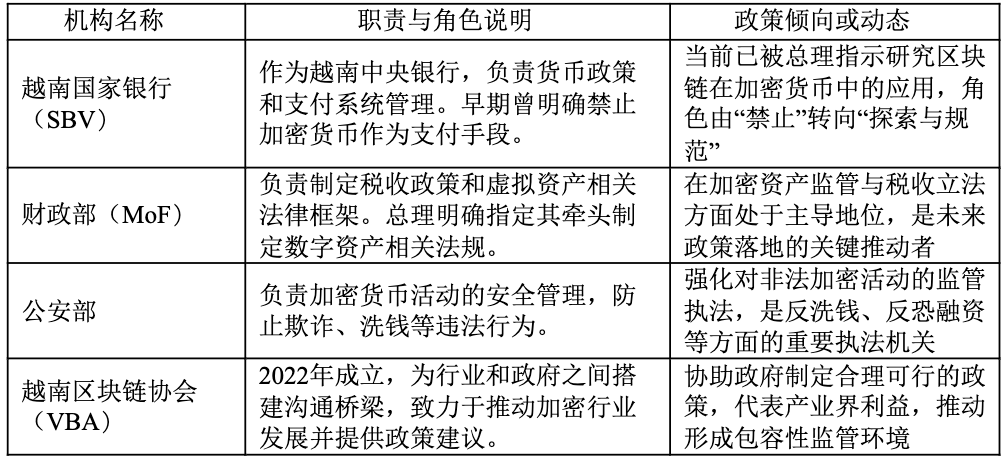Author | FinTax
introduction
For a long time, Vietnam's legal definition of cryptocurrencies was unclear, and its tax policies subsequently fell into a "gray area," leaving market participants shrouded in uncertainty. However, this situation underwent a significant change on June 14, 2025, when the Vietnamese National Assembly passed the "Digital Technology Industry Law." This, for the first time, incorporated crypto assets into the national legal framework and implemented clear classification and regulation, formally granting them legal status and marking a milestone in the country's crypto asset regulation process.
The new law categorizes digital assets into "virtual assets" and "cryptoassets," excluding financial instruments such as securities and digital fiat currencies. It also empowers the government to formulate detailed implementation rules and emphasizes strengthening cybersecurity, anti-money laundering, and counter-terrorist financing requirements. The law, slated to take effect on January 1, 2026, aims to improve the relevant legal framework, align with international regulatory standards, and help Vietnam quickly exit the FATF Grey List.
This article attempts to analyze the impact of this legislative breakthrough on Vietnam's digital economy and examine the latest developments and future trends in its tax system. By examining the Vietnamese government's policy evolution over the past few years, from cautious observation to proactive development of a regulatory framework, this article offers a comparative analysis of cryptocurrency taxation and regulation practices in Southeast Asia and other representative countries around the world. Furthermore, it explores Vietnam's strategy for balancing risk prevention and innovative development, anticipating specific policies that may be introduced in the coming years and their potential impact on Vietnam as an emerging digital economy.
1 Vietnam clarifies the legal status of crypto assets
Prior to the enactment of the Digital Technology Industry Law, Vietnam's legal definition of cryptocurrencies remained ambiguous and constantly evolving. Early on, the Vietnamese government's stance on cryptocurrencies was primarily characterized by strict restrictions on their use as a means of payment and risk warnings. For example, in Official Letter 5747/NHNN-PC, issued in July 2017, the State Bank of Vietnam (SBV) explicitly stated that cryptocurrencies like Bitcoin and Litecoin were not recognized as legal tender or means of payment in Vietnam, and explicitly prohibited their issuance, supply, and use. Violators could face administrative or criminal sanctions. Subsequently, in April 2018, the Prime Minister issued Directive 10/CT-TTg, requiring relevant departments, including the National Bureau of Statistics, the Ministry of Finance, and the Ministry of Public Security, to strengthen management of cryptocurrency-related activities, thereby strengthening controls over related transactions and preventing potential harm.
Although the Ministry of Finance announced in Official Letter 4356/BTC-TCT in April 2016 that cryptocurrency trading would not be prohibited, defining it as "property" and a liquid "commodity," the lack of clear legislative support has left this directive ambiguous in practice, complicating compliance and law enforcement related to crypto trading. Furthermore, Article 105.1 of Vietnam's 2015 Civil Code defines assets as including various items, currency, monetary instruments, and property rights. However, digital assets such as cryptocurrencies clearly do not fall into any of these categories. Therefore, under current Vietnamese law, these assets are not considered physical assets. This lack of classification creates a significant legal gap, directly impacting how these assets are treated and regulated within the legal framework.
However, this ambiguity underwent a fundamental shift on June 14, 2025. Vietnam's National Assembly passed the landmark "Law on Digital Technology Industry," which will officially take effect on January 1, 2026. This law, for the first time, clearly defines "digital assets" in Vietnamese legal system, further subdividing them into "cryptoassets" (secured by encryption and blockchain technology) and "virtual assets" (primarily used for trading and investment, but excluding securities, stablecoins, and central bank digital currencies). This legislative breakthrough ended years of uncertainty over the legal status of cryptoassets in Vietnam, officially recognizing cryptoassets as legal property under civil law, thereby providing a solid legal foundation for individuals and organizations to legally establish and exercise property rights.
This strategic shift from denial to legalization is no accident, as the Vietnamese government recognizes the enormous potential of the crypto economy. Despite regulatory hurdles, Vietnam boasts one of the highest cryptocurrency ownership rates globally, ranking fifth globally, with approximately 20.95% of the population holding crypto assets and annual inflows exceeding $100 billion. At the same time, Vietnam faces international pressure to address anti-money laundering (AML) and counter-terrorist financing (CTF) regulations, including being placed on the Financial Action Task Force (FATF) gray list, which requires it to strengthen virtual asset management. Therefore, legalization is a necessary prerequisite for attracting investment, promoting the development of the digital economy, and effectively regulating this emerging industry. This demonstrates that the Vietnamese government has shifted from simply preventing risks to actively embracing the opportunities presented by the digital economy, seeking to guide and regulate this emerging industry through the establishment of a robust legal framework, rather than simply suppressing it.
2. Vietnam’s cryptocurrency regulatory system shifts
The shift in Vietnam's official stance on cryptocurrency reflects significant changes in its regulatory system. In the past, Vietnam's cryptocurrency regulatory system was imperfect and reactive, often adopting a one-size-fits-all approach. However, with the rise of the global cryptocurrency market and changes in Vietnam's leadership, the country's cryptocurrency regulatory system is rapidly improving. Not only has a preliminary regulatory framework with division of labor been established, but the country is also actively discussing and implementing a number of regulatory pilot projects, striving to effectively address challenges such as anti-money laundering (AML) and countering the financing of terrorism (CFT) while embracing new technologies.
2.1 Review of the evolution of the regulatory framework
Vietnam's crypto regulatory framework has undergone a significant evolution from nothing to something, and from passive response to active guidance.
From 2016 to 2022, Vietnam's crypto regulatory system went through a phase of development from scratch, from a one-size-fits-all approach to exploratory research.
In April 2016, the Ministry of Finance issued an official letter stating that cryptocurrency trading would not be prohibited, but its definition was vague. Subsequently, in July 2017, the State Bank of Vietnam (SBV) explicitly banned Bitcoin and other cryptocurrencies as a means of payment, emphasizing their illegality. In April 2018, the Prime Minister issued a directive requiring stricter regulation of cryptocurrency-related activities. The SBV also instructed financial institutions to strengthen measures related to cryptocurrency transactions, reflecting the government's early cautious and risk-averse stance.
In May 2020, the Prime Minister instructed the SBV to launch a pilot project to explore the use of blockchain in cryptocurrencies and tasked it with researching and evaluating the pros and cons of cryptocurrencies. In March 2022, the Vietnam Blockchain Association (VBA) was established as Vietnam's first legal entity focused on crypto assets, tasked with creating and fostering a framework for cryptocurrency development. That same year, Vietnam passed anti-money laundering (AML) legislation, which came into effect in 2023 and requires payment service providers to implement Know Your Customer (KYC) measures, a significant step towards international compliance. In October 2022, the Prime Minister reiterated his call for cryptocurrency regulation, demonstrating the government's urgent need for standardization in the sector.
After 2023, especially after the changes in Vietnam's top leadership in 2024, Vietnam's regulatory attitude towards cryptocurrencies gradually softened.
In February 2024, the Prime Minister issued Decision No. 194/QD-TTg, instructing the Ministry of Finance to draft a legal framework for virtual assets, confirming the government's legislative commitment. In October of the same year, the Prime Minister signed Decision No. 1236/QD-TTg, promulgating the "National Strategy for the Development and Application of Blockchain Technology in Vietnam to 2025," with a vision for 2030, aiming to establish Vietnam as a regional leader in blockchain innovation. This strategy explicitly identifies blockchain as a core pillar of digital transformation and emphasizes "Made in Vietnam" blockchain platforms, demonstrating the government's recognition of blockchain and digital assets as key drivers of the country's digital economy.
In June 2025, the Digital Technology Industry Law was passed, which established a tolerant and prudent regulatory framework to promote the development of a wider digital economy from multiple aspects, including clarifying the classification of digital assets (crypto assets, virtual assets), enforcing anti-money laundering (AML) and counter-terrorist financing (CTF) measures, introducing a licensing system, and providing incentives for emerging technologies such as artificial intelligence, semiconductors and advanced computing.

The maturation of the regulatory framework, from a reactive approach to proactive guidance, is a key characteristic of Vietnam's evolving digital asset policies. Early on, Vietnam's cryptocurrency regulation primarily focused on prohibitions on using cryptocurrencies as a means of payment and risk warnings, a passive, preventative approach. However, in the past two years, from the Prime Minister's directive to research and establish a blockchain association to the promulgation of the Digital Technology Industry Law and the National Blockchain Strategy, the regulatory focus has clearly shifted to proactively building a framework, incorporating crypto assets into the national digital economy development strategy. This marks a more mature and pragmatic phase in Vietnam's digital asset regulation. The goal is no longer simply to control risks, but to unleash innovation potential through the establishment of a clear and predictable legal environment, attract domestic and international investment, and enhance its position in the global digital economy.
2.2 Overview of Vietnam’s existing regulatory framework and division of labor system
Vietnam's current crypto regulatory framework is primarily divided among various ministries, resulting in a "loose regulation" structure. Key institutions, including the State Bank of Vietnam (SBV), the Ministry of Finance (MoF), the Ministry of Public Security, and the Vietnam Blockchain Association (VBA), are collaborating to build and improve the regulatory framework. The detailed division of labor is shown in the table below.

2.3 Regulatory Sandbox Pilot and Risk Compliance Construction under the New Normal
In order to explore innovative applications of digital assets under the premise of controllable risks, the Vietnamese government has actively introduced regulatory sandbox mechanisms and pilot projects.
The Vietnamese government is discussing establishing a regional and international financial hub, a key aspect of which is the introduction of a controlled testing policy (sandbox) for financial technology (Fintech), particularly for business models involving crypto assets and cryptocurrencies. This sandbox mechanism allows for small-scale testing of new financial technologies and business models in a controlled environment, assessing their potential risks and benefits before full-scale implementation. For example, Da Nang has been approved to pilot special mechanisms, including a pilot program using the stablecoin USDT for international tourist payments. This is seen as a significant effort to explore the application of digital payments in the tourism industry. These pilot programs aim to accumulate practical experience and provide data and evidence for a more comprehensive regulatory framework.
Vietnam is also actively exploring the development of a central bank digital currency (CBDC)—the digital Som. The Prime Minister has repeatedly called on the SBV to study the pros and cons of digital currencies and launch a pilot blockchain-based cryptocurrency project. While the issuance of the digital Som is still in the evaluation phase, its potential legal status and complementary role to the traditional financial system are crucial components of Vietnam's digital economy.
Of course, while promoting innovation in the regulatory framework, anti-money laundering (AML) and counter-terrorist financing (CTF) compliance remains a core concern for the Vietnamese authorities, especially after it was placed on the Financial Action Task Force (FATF) grey list.
Vietnam currently remains on the Financial Action Task Force's (FATF) "enhanced review list" (grey list) due primarily to deficiencies in its crypto-related anti-money laundering practices. Being placed on the grey list indicates that the country has strategic deficiencies in combating money laundering and terrorist financing, potentially impacting its international financial reputation and ability to attract foreign investment. To be removed from the grey list, Vietnam must develop virtual asset management policies and strengthen related law enforcement.
The passage of the Digital Technology Industry Law is a significant step for Vietnam in addressing FATF pressure. The law explicitly mandates strict implementation of anti-money laundering (AML) and counter-terrorist financing (CTF) measures for all digital asset activities to enhance security and transparency. This means that future crypto exchanges and related service providers will be required to adhere to global standards such as Know Your Customer (KYC) and Anti-Money Laundering (AML). They may also be required to maintain compensation funds to protect users from cyberattacks, thereby mitigating the risk of financial crime.
3 Vietnam’s cryptocurrency tax policy and its latest developments
Vietnam's cryptocurrency tax policy has evolved almost in parallel with its regulatory policies. Initially, due to the Vietnamese authorities' vague and contradictory characterization of cryptocurrencies and their extensive, one-size-fits-all regulatory policies, taxing cryptocurrencies was not practical. However, the rapid expansion of cryptocurrency trading volume has forced the government to address its legal status, forcing them to conduct research on cryptocurrencies. In particular, as 2024 approaches, the government has shown a greater urgency in establishing a clear legal framework.
3.1 Currently, cryptocurrency transactions in Vietnam are still in a tax gray area
For a long time, cryptocurrency transactions in Vietnam have been mired in tax ambiguity due to a lack of clear legal definitions and regulatory frameworks. As mentioned above, while the Vietnamese Ministry of Finance's 2016 official letter 4356/BTC-TCT does not prohibit cryptocurrency transactions and defines them as "property" and "commodities," it does not provide specific tax regulations. Furthermore, the State Bank of Vietnam (SBV) explicitly disallowed Bitcoin and other cryptocurrencies as a means of payment in its 2017 official letter 5747/NHNN-PC, further exacerbating legal uncertainty and making it difficult for tax authorities to effectively tax cryptocurrency activities. Furthermore, Vietnam's 2015 Civil Code does not include digital assets in its definition of property, creating significant obstacles to cryptocurrency taxation.
Compared to Vietnam's clear stock trading tax system, crypto activities have been exempt from tax obligations for a long time. This situation has made Vietnam a de facto "tax haven" in the crypto sector, attracting a large number of crypto investors but also resulting in a huge gap in government tax revenue.
3.2 New Regulations Outline the Legal Framework for Cryptocurrency Taxation
The Digital Technology Industry Law, which will officially take effect on January 1, 2026, marks a key step in Vietnam's cryptocurrency tax policy. While not a direct cryptocurrency tax law, it lays the legal foundation for future taxation. While excluding securities, stablecoins, and central bank digital currencies (CBDCs), the new law clearly defines "crypto assets" and "virtual assets" at the legal level for the first time. This landmark definition changes the previously ambiguous legal status of cryptocurrencies in Vietnam, potentially allowing them to be recognized as legal property.
Against this backdrop, the Ministry of Finance is finalizing a draft resolution on a pilot program for the issuance and trading of cryptocurrencies. The pilot program will assess the possibility of applying Value Added Tax (VAT), Corporate Income Tax (CIT), and Personal Income Tax (PIT) to crypto-asset transactions. The pilot program will be conducted on a small scale and closely monitored by state regulatory agencies to examine how to determine income from crypto-assets, thereby establishing transparent regulations, avoiding budget losses, and protecting investor rights.
There are various discussions regarding the proposed tax rates. One suggestion is to impose a 0.1% transaction tax on crypto transactions, similar to stock trading, which is considered to generate significant revenue without unduly stifling market activity. If cryptocurrencies are classified as investment assets, trading profits could be subject to capital gains tax, similar to stocks or real estate. Businesses engaging in cryptocurrency trading may be subject to the standard 20% corporate income tax. Other proposals include imposing a 5–10% personal income tax on profits from non-fungible tokens, a 1–5% withdrawal fee on profits for foreign investors, and consideration of a 10% corporate income tax incentive for pilot exchanges (for the first five years) and a VAT exemption for digital asset transactions to promote liquidity.
4 Outlook on Vietnam’s Cryptocurrency Policy
The Vietnamese authorities' attitude toward crypto-assets has undergone a significant shift, from early caution and restrictions to current active exploration and regulation. This shift reflects a pragmatic balance between controlling financial risks (such as money laundering and fraud) and seizing opportunities for digital economic development. Authorities may have recognized that simply banning or ignoring crypto-assets would lead to an outflow of talent and capital and a missed opportunity to capitalize on the global digital economy. In fact, Vietnamese authorities have included blockchain technology, digital assets, and cryptocurrencies in their list of national strategic technologies, alongside cloud computing and artificial intelligence. This indirectly demonstrates that Vietnam views digital assets as a key element in driving the country's digital transformation and economic growth.
Based on current development trends and clear signals from the government, there is reason to believe that Vietnam's future crypto asset policy will continue to be characterized by "inclusiveness and prudence." Specifically, the following predictions can be made about the direction of Vietnam's future crypto asset policy:
First, more detailed regulatory rules will be introduced and implemented. With the entry into force of the Digital Technology Industry Law, more supporting regulations and guidelines will be issued to clarify licensing requirements, operating standards, and consumer protection measures for cryptoasset service providers. Regulatory sandboxes will continue to play a role, providing a controlled testing environment for new business models and technologies, allowing for the accumulation of experience and the refinement of the long-term regulatory framework, ensuring that innovation proceeds within manageable risks.
Second, the tax framework will be gradually refined and implemented. It is expected that after the Digital Technology Industry Law takes effect, the Ministry of Finance will expedite the release of detailed tax regulations to clarify the taxation methods, tax rates, and collection and management procedures for various crypto-related activities. The successful tax systems of e-commerce platforms are likely to be incorporated into crypto-related trading platforms to improve tax efficiency and compliance. Vietnam may also develop differentiated tax policies for different types of crypto-related activities and consider combining capital gains tax with turnover tax to achieve fair and effective taxation.
Third, digital assets will gradually merge with the traditional financial system. The Vietnamese government will continue to promote the integration of digital assets with the traditional financial system, such as exploring the development of crypto banks, national crypto exchanges, and stablecoins to build a more modern financial infrastructure.
In short, Vietnam may become a model of "compliant innovation" in Southeast Asia's crypto economy, competing alongside Thailand and Malaysia for the region's crypto market. Vietnam boasts a substantial crypto user base and a relatively clear digital economy development strategy. The recently passed Digital Technology Industry Law and ongoing tax pilot programs and sandbox mechanisms demonstrate its ongoing transition from a "gray area" to "clear regulations." This transformation will distinguish it in Southeast Asia as a market that embraces innovation while ensuring compliance. Vietnam's experience may offer a viable model for other emerging and developing markets: how to gradually establish a robust cryptoasset regulatory and taxation system without stifling innovation, thereby transforming the crypto market's potential into a driver of national economic growth.







